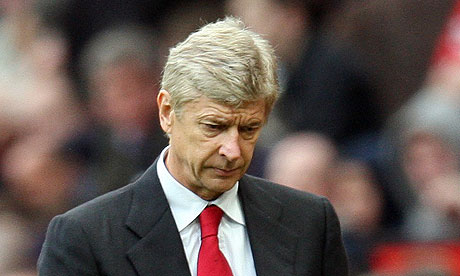When his side was invincible, Arsène Wenger was quite properly given credit for his genius. Now failure has to be laid at his door

Arsène Wenger has pursued a policy of restocking his squad with promising young players but not enough of them have fulfilled his ambitions, and not enough senior players of stature have been recruited. Photograph: Carl Recine/Action Images
If they were a regiment of soldiers, Arsenal would be swiftly withdrawn from the line. In their fifth game of a new season, they looked weary and shell-shocked. The general who led them to so many victories now stands stripped of his virtue, his plans dismantled by an old foe whose own troops looked fit for this or any other battle.
Arsène Wenger is a strong character – no one who survives at the helm of a Premier League side for a decade and a half could be anything else – but in the wake of this defeat, in which Arsenal conceded eight goals for the first time in more than a century, you had to wonder whether he will be able to summon the resilience needed to overcome such a catastrophe.
"You know me well," he said on Sunday night, from behind a dignified façade. "I think you should give me some time before you say I have got it completely wrong." But everything he has built with such loving care over 15 years had just come crashing down at the home of the club who have provided the reference point since his arrival in England and whom he once aspired to remove from the pinnacle of English football.
In effect, Sir Alex Ferguson had taken him on at his own game – the placing of trust in skill, enterprise and gilded youth – and triumphed in every conceivable dimension.
Back in 2002, after his side had just won the Double, Wenger spoke of "a shift in the balance of power". He was talking about disrupting United's hegemony on a permanent basis, and for a while he seemed to be making it come true. But this defeat came as the culmination of a sequence of events which have been building since their defeat in the European Cup final with a lacklustre performance against Barcelona in the spring of 2006.
United, of course, have lost two European Cup finals against the Catalans in recent years, giving a similarly unsatisfactory account of themselves on both occasions. But Ferguson reacted to those failures by ensuring that the club suffered no loss of self-esteem. The same cannot be said for Wenger and Arsenal.
Until this month, when he was forced to part with Cesc Fábregas and Samir Nasri, the Frenchman had a reputation for letting top players move elsewhere only when it suited Arsenal's purposes, or at least their finances. For a long time he pursued a policy of restocking his squad with promising young players whom he could rely on to accept his philosophy. Not enough of them have fulfilled his ambitions and not enough senior players of stature have been recruited to help bring them to maturity.
It would be easy enough to place the blame on the players in his patched-up team. For all the suspensions and injuries – three of one and five of the other – that afflicted the squad, there were still two or three senior figures wearing Arsenal shirts whom he would have been better off without. Andrey Arshavin and Tomas Rosicky, both of them experienced internationals, were among the side's most feckless performers.
Robin van Persie was another. When Fábregas left this month, Wenger transferred the captaincy to the Dutch striker – seemingly another in the line of star players to whom he has given the armband as a way of persuading them to stay at the club – rather than identifying a proper leader in the mould of Eddie Hapgood, Joe Mercer, Frank McLintock, Tony Adams or Patrick Vieira. On Sunday Van Persie rewarded him by hitting a penalty so poorly that David de Gea was able to make a good save.
It was the 27th minute, and the score was 1-0 to United. An equaliser might have changed the complexion of the contest. The failure knocked them back, and no group of players have more recent experience of such an occurrence than Arsenal, who so clearly benefited when Antonio Di Natale failed to score from the penalty spot in Italy last Wednesday night. Wojciech Szczesny's save invigorated Arsenal while deflating Udinese, and De Gea's success exerted precisely the same effect. A few seconds later Ashley Young scored the first of his two tremendous goals and the contest was over.
In his role as a curator of young talent, Wenger will be hoping that the nature of the defeat does not have a lasting effect on Francis Coquelin and Alex Oxlade-Chamberlain, the two young debutants whom he found himself selecting here. Neither should have been exposed to such an ordeal.
When his side were invincible, Wenger was quite properly given the credit for his genius. Now failure must be laid at his door. And on Sunday night he suffered the additional humiliation of being patronised by his greatest rival.
"When you lose a few games the judge is out and we've seen managers go early in the season many, many times," Ferguson said. "It's unfair, but it keeps on going."
Wenger will buy a player or two before the transfer window closes on Wednesday night, the club's unhelpful wage structure permitting, although it may now be harder to persuade those who were watching on Sunday. He will get his missing players back. But it will be a long time before the scars of this extraordinary defeat are allowed to fade.
Không có nhận xét nào:
Đăng nhận xét